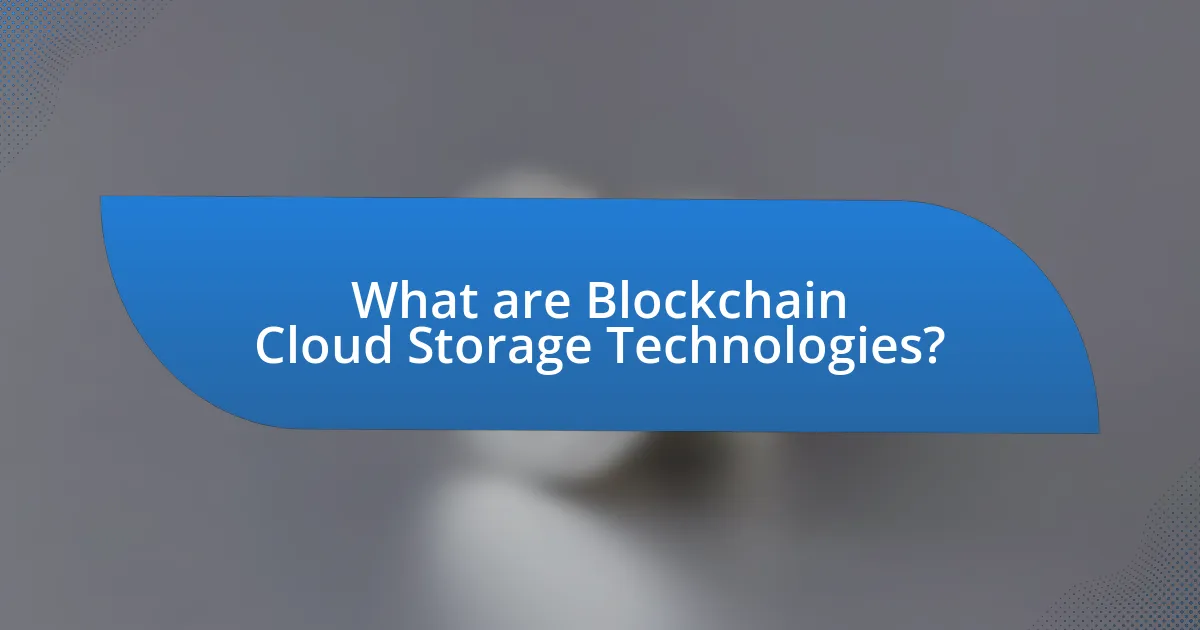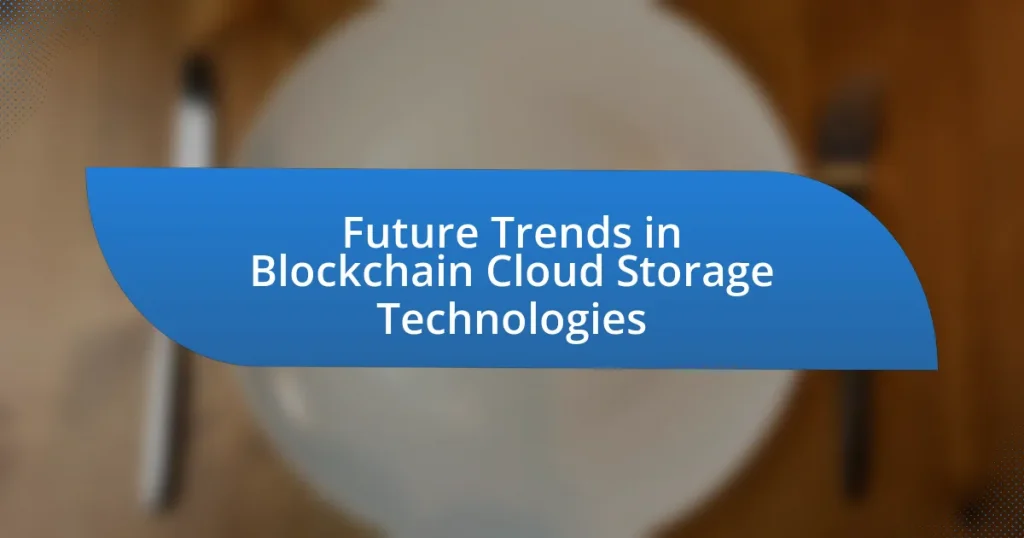Blockchain cloud storage technologies represent a decentralized approach to data management, utilizing blockchain networks to enhance security, integrity, and user control over data. This article explores the integration of blockchain with cloud storage, highlighting key features such as decentralization, enhanced security through cryptography, and transparency. It also addresses current challenges, including scalability and regulatory compliance, while examining emerging trends like artificial intelligence and interoperability that are shaping the future of these technologies. The implications for data privacy and best practices for organizations adopting blockchain cloud storage are also discussed, providing a comprehensive overview of the evolving landscape in this field.

What are Blockchain Cloud Storage Technologies?
Blockchain cloud storage technologies are decentralized systems that utilize blockchain networks to store and manage data securely. These technologies leverage the principles of blockchain, such as immutability and transparency, to provide enhanced data security and integrity compared to traditional cloud storage solutions. For instance, platforms like Filecoin and Storj enable users to rent out unused storage space while ensuring that data is encrypted and distributed across multiple nodes, reducing the risk of data breaches. This decentralized approach not only enhances security but also promotes data ownership and control for users, as they can manage their data without relying on a central authority.
How do Blockchain and Cloud Storage integrate?
Blockchain and cloud storage integrate by utilizing blockchain technology to enhance data security, integrity, and accessibility in cloud environments. This integration allows for decentralized data management, where blockchain serves as a secure ledger that records transactions and changes to data stored in the cloud. For instance, companies like Storj and Sia leverage blockchain to create decentralized cloud storage solutions, ensuring that data is encrypted and distributed across multiple nodes, reducing the risk of data breaches. Furthermore, the immutability of blockchain records ensures that any alterations to the data can be tracked and verified, providing an additional layer of trust and transparency in cloud storage services.
What are the key features of Blockchain Cloud Storage?
The key features of Blockchain Cloud Storage include decentralization, enhanced security, data integrity, and transparency. Decentralization allows data to be stored across multiple nodes, reducing reliance on a single point of failure and enhancing resilience against attacks. Enhanced security is achieved through cryptographic techniques, ensuring that data is encrypted and access is controlled via private keys. Data integrity is maintained as blockchain technology provides an immutable ledger, making it nearly impossible to alter stored information without detection. Transparency is inherent in blockchain systems, as all transactions are recorded and can be audited by authorized parties, fostering trust among users. These features collectively contribute to a more secure and reliable storage solution compared to traditional cloud storage systems.
How does decentralization enhance data security in Blockchain Cloud Storage?
Decentralization enhances data security in Blockchain Cloud Storage by distributing data across multiple nodes rather than storing it in a single location. This distribution minimizes the risk of data breaches, as compromising one node does not grant access to the entire dataset. Additionally, decentralized systems utilize cryptographic techniques to secure data, ensuring that only authorized users can access or modify it. For instance, a study by the International Journal of Information Management highlights that decentralized storage systems significantly reduce the likelihood of unauthorized access and data tampering compared to centralized systems. This structural integrity and enhanced security make decentralized Blockchain Cloud Storage a robust solution for safeguarding sensitive information.
What are the current challenges facing Blockchain Cloud Storage?
Current challenges facing Blockchain Cloud Storage include scalability, data privacy, and regulatory compliance. Scalability issues arise because blockchain networks often struggle to handle large volumes of data efficiently, leading to slower transaction speeds and higher costs. Data privacy concerns stem from the transparent nature of blockchain, which can expose sensitive information unless adequately encrypted. Regulatory compliance is another significant challenge, as varying laws across jurisdictions create complexities for businesses looking to adopt blockchain solutions for cloud storage. These challenges hinder widespread adoption and integration of blockchain technology in cloud storage systems.
How do scalability issues affect Blockchain Cloud Storage adoption?
Scalability issues significantly hinder Blockchain Cloud Storage adoption by limiting the system’s ability to handle increasing amounts of data and transactions efficiently. As blockchain networks grow, the time and resources required to process transactions can lead to delays and higher costs, making them less attractive for users seeking reliable storage solutions. For instance, Bitcoin’s transaction throughput is approximately 7 transactions per second, while traditional cloud storage solutions can handle thousands, demonstrating a clear disparity that affects user preference. Consequently, the inability to scale effectively can deter businesses from integrating blockchain technology into their storage strategies, ultimately stalling broader adoption.
What are the regulatory concerns surrounding Blockchain Cloud Storage?
Regulatory concerns surrounding Blockchain Cloud Storage primarily include data privacy, compliance with existing laws, and security standards. Data privacy issues arise due to the decentralized nature of blockchain, which can complicate adherence to regulations like the General Data Protection Regulation (GDPR) that mandates user data control and the right to be forgotten. Compliance challenges stem from the lack of clear legal frameworks specifically addressing blockchain technology, leading to uncertainties in how existing laws apply. Additionally, security standards are a concern as blockchain systems must ensure robust protection against breaches while meeting regulatory requirements for data integrity and availability. These concerns highlight the need for regulatory clarity and frameworks that can effectively govern the unique aspects of blockchain cloud storage.

What are the emerging trends in Blockchain Cloud Storage Technologies?
Emerging trends in Blockchain Cloud Storage Technologies include increased decentralization, enhanced security through cryptographic methods, and the integration of artificial intelligence for data management. Decentralization allows users to store data across multiple nodes, reducing reliance on centralized servers and enhancing data availability. Enhanced security is achieved through advanced encryption techniques, ensuring that data remains private and tamper-proof. Additionally, the integration of artificial intelligence facilitates efficient data retrieval and management, optimizing storage solutions. These trends are supported by the growing adoption of blockchain technology across various industries, which is projected to reach a market size of $163.24 billion by 2029, according to Fortune Business Insights.
How is Artificial Intelligence influencing Blockchain Cloud Storage?
Artificial Intelligence is enhancing Blockchain Cloud Storage by improving data management, security, and efficiency. AI algorithms analyze vast amounts of data stored on blockchain networks, enabling better organization and retrieval of information. For instance, AI can automate the categorization of files and optimize storage allocation, which reduces costs and increases performance. Additionally, AI enhances security through predictive analytics, identifying potential threats and vulnerabilities in real-time, thereby safeguarding sensitive data. Research indicates that integrating AI with blockchain can lead to a 30% increase in operational efficiency in data handling processes, demonstrating the significant impact of AI on this technology.
What role does AI play in data management within Blockchain Cloud Storage?
AI enhances data management in Blockchain Cloud Storage by automating processes such as data classification, retrieval, and security. Through machine learning algorithms, AI can analyze vast amounts of data stored on blockchain networks, identifying patterns and anomalies that improve data integrity and access efficiency. For instance, AI-driven analytics can optimize storage allocation and predict data usage trends, leading to more efficient resource management. Additionally, AI can bolster security measures by detecting unauthorized access attempts and ensuring compliance with data governance policies, thereby reinforcing the overall reliability of blockchain cloud storage solutions.
How can AI enhance security protocols in Blockchain Cloud Storage?
AI can enhance security protocols in Blockchain Cloud Storage by implementing advanced threat detection and response mechanisms. By utilizing machine learning algorithms, AI can analyze vast amounts of data in real-time to identify unusual patterns or anomalies that may indicate security breaches. For instance, AI systems can monitor user behavior and access patterns, flagging any deviations that could suggest unauthorized access or data tampering. Research has shown that AI-driven security solutions can reduce the time to detect and respond to threats by up to 90%, significantly improving the overall security posture of blockchain cloud storage systems.
What advancements in interoperability are shaping Blockchain Cloud Storage?
Advancements in interoperability shaping Blockchain Cloud Storage include the development of cross-chain protocols, which enable seamless data transfer between different blockchain networks. These protocols, such as Polkadot and Cosmos, facilitate communication and data sharing across diverse blockchain ecosystems, enhancing the usability and flexibility of cloud storage solutions. Additionally, the integration of decentralized identity solutions allows users to manage their data across multiple platforms securely, promoting user control and privacy. These advancements are supported by increasing collaboration among blockchain projects, which fosters standardization and compatibility, ultimately driving broader adoption of blockchain cloud storage technologies.
How does interoperability improve user experience in Blockchain Cloud Storage?
Interoperability enhances user experience in Blockchain Cloud Storage by enabling seamless data exchange across different blockchain platforms. This capability allows users to access and manage their data without being confined to a single blockchain ecosystem, thus increasing flexibility and usability. For instance, users can transfer files between various storage solutions, ensuring that they can utilize the best features of each platform. Additionally, interoperability fosters collaboration among different services, which can lead to improved functionality and user satisfaction. Studies indicate that systems designed with interoperability in mind can reduce transaction times and costs, further enhancing the overall user experience in blockchain environments.
What are the implications of cross-chain solutions for Blockchain Cloud Storage?
Cross-chain solutions significantly enhance Blockchain Cloud Storage by enabling interoperability between different blockchain networks. This interoperability allows for seamless data transfer and storage across various platforms, increasing flexibility and accessibility for users. For instance, users can store data on one blockchain while utilizing the computational power of another, optimizing resource use and reducing costs. Additionally, cross-chain solutions can improve data redundancy and security, as data can be distributed across multiple chains, mitigating risks associated with single points of failure. The ability to leverage diverse blockchain features fosters innovation in storage solutions, ultimately leading to more robust and efficient cloud storage systems.

What are the future implications of Blockchain Cloud Storage Technologies?
The future implications of Blockchain Cloud Storage Technologies include enhanced data security, improved data integrity, and decentralized control over data. These technologies leverage cryptographic techniques to secure data, making it resistant to unauthorized access and tampering. For instance, a study by Gartner predicts that by 2025, 75% of organizations will be using decentralized storage solutions, highlighting a shift towards more secure and efficient data management practices. Additionally, the decentralized nature of blockchain allows users to maintain control over their data, reducing reliance on centralized service providers and mitigating risks associated with data breaches.
How will Blockchain Cloud Storage impact data privacy in the future?
Blockchain Cloud Storage will enhance data privacy in the future by decentralizing data management and providing users with greater control over their information. This technology allows data to be stored across a distributed network of nodes, reducing the risk of centralized data breaches. According to a report by the World Economic Forum, decentralized storage solutions can significantly lower the chances of unauthorized access, as data is encrypted and fragmented across multiple locations. Furthermore, blockchain’s inherent transparency and immutability ensure that any access to data is recorded and verifiable, thereby increasing accountability and trust in data handling practices.
What measures can be taken to ensure user privacy in Blockchain Cloud Storage?
To ensure user privacy in Blockchain Cloud Storage, implementing encryption techniques is essential. Encryption protects data by converting it into a format that is unreadable without the appropriate decryption key, thus safeguarding sensitive information from unauthorized access. Additionally, utilizing decentralized storage solutions enhances privacy by distributing data across multiple nodes, reducing the risk of a single point of failure or data breach.
Moreover, employing zero-knowledge proofs allows users to verify transactions without revealing the underlying data, further enhancing privacy. According to a study published in the “Journal of Cryptology,” these methods significantly reduce the likelihood of data exposure while maintaining the integrity of the blockchain.
How will evolving regulations shape the future of Blockchain Cloud Storage?
Evolving regulations will significantly shape the future of Blockchain Cloud Storage by establishing compliance frameworks that enhance security and user trust. As governments and regulatory bodies implement stricter data protection laws, such as the General Data Protection Regulation (GDPR) in Europe, Blockchain Cloud Storage providers will need to adapt their services to ensure compliance, which may lead to increased transparency and accountability in data handling practices. Furthermore, regulations addressing cryptocurrency and digital assets will influence how Blockchain Cloud Storage platforms manage transactions and user identities, potentially fostering innovation in decentralized storage solutions that prioritize user privacy and data sovereignty. The necessity for compliance will drive technological advancements, as providers seek to integrate regulatory requirements into their blockchain architectures, ensuring that they can operate legally while offering secure and efficient storage options.
What best practices should organizations follow when adopting Blockchain Cloud Storage?
Organizations should prioritize data security, regulatory compliance, and interoperability when adopting Blockchain Cloud Storage. Ensuring robust encryption methods protects sensitive information, while adherence to regulations like GDPR and HIPAA safeguards against legal issues. Furthermore, selecting platforms that support interoperability with existing systems enhances operational efficiency and user experience. According to a report by Deloitte, 40% of organizations cite security as a primary concern in cloud adoption, underscoring the importance of these best practices in mitigating risks associated with Blockchain Cloud Storage.
How can organizations assess their readiness for Blockchain Cloud Storage implementation?
Organizations can assess their readiness for Blockchain Cloud Storage implementation by evaluating their existing infrastructure, technical expertise, and regulatory compliance. A thorough analysis of current data management practices, including security protocols and scalability, is essential to identify gaps that blockchain technology can address. Additionally, organizations should conduct a skills assessment to determine if their workforce possesses the necessary knowledge of blockchain principles and cloud technologies.
Research indicates that 70% of organizations face challenges in integrating new technologies due to a lack of skilled personnel (Source: Deloitte, “The Future of Work in Technology”). Furthermore, understanding regulatory requirements specific to blockchain, such as data privacy laws, is crucial for compliance and successful implementation. By systematically reviewing these factors, organizations can create a roadmap for effective Blockchain Cloud Storage integration.
What strategies can enhance the successful integration of Blockchain Cloud Storage?
To enhance the successful integration of Blockchain Cloud Storage, organizations should adopt a multi-faceted approach that includes interoperability, robust security protocols, and user education. Interoperability ensures that different blockchain systems can communicate effectively, facilitating seamless data transfer and access across platforms. Implementing robust security protocols, such as end-to-end encryption and decentralized identity management, protects sensitive data and builds user trust. Additionally, user education on the benefits and functionalities of blockchain technology can drive adoption and encourage best practices in data management. These strategies are supported by industry trends indicating that organizations prioritizing interoperability and security see higher rates of successful blockchain implementation, as evidenced by case studies from companies like IBM and Microsoft, which have reported increased efficiency and reduced costs through effective blockchain integration.


